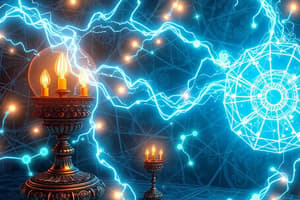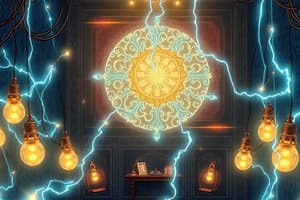Podcast
Questions and Answers
What is the primary function of a switch in an electrical circuit?
What is the primary function of a switch in an electrical circuit?
- To make or break the circuit (correct)
- To increase voltage
- To store electrical energy
- To convert electrical energy to sound energy
A dry cell can be used effectively to light up huge buildings.
A dry cell can be used effectively to light up huge buildings.
False (B)
What is the term for a portable source of electrical energy?
What is the term for a portable source of electrical energy?
battery
The electric current in a closed circuit always flows from the _______ terminal of the cell to the _______ terminal.
The electric current in a closed circuit always flows from the _______ terminal of the cell to the _______ terminal.
Match the following devices with their functions:
Match the following devices with their functions:
What is the primary purpose of an electric switch in an electric circuit?
What is the primary purpose of an electric switch in an electric circuit?
Electrical wires are generally made up of metals.
Electrical wires are generally made up of metals.
What are two precautions that should be exercised while dealing with electricity?
What are two precautions that should be exercised while dealing with electricity?
An electric cell has _______ terminals. The metal cap is _______ terminal of the cell.
An electric cell has _______ terminals. The metal cap is _______ terminal of the cell.
Match the following terms with their definitions:
Match the following terms with their definitions:
Which of the following materials is typically a good insulator of electricity?
Which of the following materials is typically a good insulator of electricity?
In an open circuit, the switch is in the ON position.
In an open circuit, the switch is in the ON position.
What happens if both terminals of a cell are directly connected without a switch and bulb?
What happens if both terminals of a cell are directly connected without a switch and bulb?
Flashcards
Electric Circuit
Electric Circuit
A closed path through which electricity can flow from the positive end of the battery to the negative end.
Switch
Switch
A device used to break or complete an electric circuit, controlling the flow of electricity.
Conductor
Conductor
A material that allows electricity to flow through it easily.
Battery
Battery
Signup and view all the flashcards
Insulator
Insulator
Signup and view all the flashcards
What is the purpose of an electric switch in a circuit?
What is the purpose of an electric switch in a circuit?
Signup and view all the flashcards
How are dry cells different from chargeable cells?
How are dry cells different from chargeable cells?
Signup and view all the flashcards
Why are insulators important in electrical circuits?
Why are insulators important in electrical circuits?
Signup and view all the flashcards
What are the essential components of an electric circuit?
What are the essential components of an electric circuit?
Signup and view all the flashcards
What is a closed circuit?
What is a closed circuit?
Signup and view all the flashcards
What is an open circuit?
What is an open circuit?
Signup and view all the flashcards
Differentiate between a conductor and insulator of electricity.
Differentiate between a conductor and insulator of electricity.
Signup and view all the flashcards
Why is the filament of an electric bulb made of tungsten?
Why is the filament of an electric bulb made of tungsten?
Signup and view all the flashcards
Study Notes
Electric Circuits
- An electric switch is used to open or close a circuit, controlling the flow of electricity.
- Precautions when working with electricity include avoiding contact with wet hands and wearing rubber gloves.
- A closed circuit is a complete pathway for electricity to flow, including a source (e.g., a cell), a load (e.g., a bulb), a switch, and connecting wires.
- Insulators prevent the flow of electricity and are essential in electrical circuits to stop unwanted currents.
- Key components in an electric circuit: source, load, switch, connecting wires.
- Dry cells produce less electricity than rechargeable cells and cannot be recharged.
- Conductors (e.g., copper) allow electric current to flow, while insulators (e.g., plastic) prevent it.
- The term "electricity" originated from the Greek word elektron.
- A torch circuit diagram should be labeled with components like the cell, bulb, switch, connecting wires, and their purpose.
- An open circuit does not allow electricity to flow through it because the pathway is not complete.
- Poor contacts within a circuit may cause the bulb not to glow.
- Electricians wear rubber gloves to protect themselves from electrical shocks.
- Plastic is used in electrical switches and boards because it acts as an insulator.
- Connecting cell terminals directly without a switch will produce a short circuit.
- The filament in an electric bulb is made of tungsten because of its high melting point and ability to withstand high temperatures.
- To increase the power of a torch, it would be better to use more electric cells/batteries.
- Different types of cells are suitable for specific uses, e.g., car batteries, transistor radios, and hearing aids having differences.
- Solar panels are used in satellites as a power source as space doesn't have access to readily available grid power.
- Aluminium foil can be used to cover electric wires but use of plastic remains most prevalent to protect them.
Electric Circuit Components and Uses
- Electric bulbs convert electrical energy to light energy and heat.
- Electric current travels through conductors (allowing the flow of electric current).
- Electrical energy travels through an electric circuit.
- Materials that stop electric energy passing through them (insulators) are used to cover wires and components.
- Cells convert chemical energy into electrical energy.
Studying That Suits You
Use AI to generate personalized quizzes and flashcards to suit your learning preferences.




